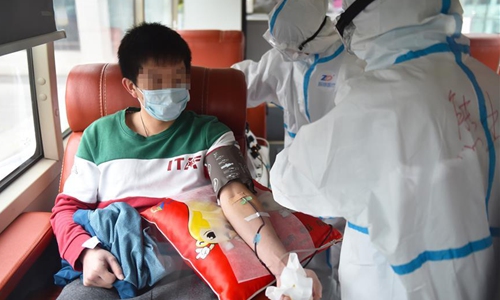Trump's plasma 'breakthrough' an 'awkward boast,' shows election anxiety: experts
By Liu Caiyu Source: Global Times Published: 2020/8/24 17:57:59
Trump’s plasma ‘breakthrough’ an ‘awkward boast,’ shows election anxiety: experts

A recovered COVID-19 patient donates plasma on a blood donation bus in Beijing, capital of China, Feb. 27, 2020. Two recovered patients of novel coronavirus infection donated plasma in Beijing. Photo:Xinhua
Touting the use of blood plasma donated by people who have recovered to treat COVID-19 patients as a "breakthrough" is nothing more than an "awkward boast" by US President Donald Trump, as the therapy, despite being used in China for curing COVID-19 patients, was only limited as an exploratory treatment since six months ago. Chinese netizens and experts said it would be more of a "breakthrough" for the president attempting to repair his sagging popularity ahead of the presidential election.
Trump claimed that convalescent plasma was a "powerful therapy" that had an "incredible rate of success", and his emergency authorization could "dramatically expand access to this treatment" at a press conference on Sunday, prompting ridicule on Chinese social media on Monday.
"Shock! A method that has been found to be effective and been used in China's clinical treatment from half a year ago just being discovered by the US," a Chinese netizen commented. Another said, "Compared to Trump's disinfectant injection idea for treating COVID-19, it is indeed a breakthrough."
The topic of Trump authorized convalescent plasma treatment generated over 220 million views as of time on Sina Weibo.
Convalescent plasma is purely an emergency way of treating severely ill COVID-19 patients, and is not a new method, as it proved effective in the very early stages of the epidemic in Wuhan, Central China's Hubei Province, and was later adopted by the National Health Commission as a standard treatment for the novel coronavirus, an immunologist based in Beijing told the Global Times on condition of anonymity.
Since there is no specific drug or vaccine against the coronavirus, plasma therapy was included in China's novel coronavirus diagnosis and treatment plan for small scale use and only among severe patients, and it proved to be effective in clinical trials, Zhang Yuexin, a Xinjiang-based expert in infectious disease studies, told the Global Times.
In February, China's National Health Commission added the use of blood plasma taken from people who have recovered from the coronavirus as a form of therapy for critically ill patients whose condition is rapidly deteriorating in the new edition of its treatment plan for COVID-19.
Before the COVID-19 outbreak, plasma treatment had also been tried in the prevention and treatment of infectious diseases in the past ten years, including SARS in 2003, the Ebola outbreak in Africa and H1N1 influenza, the immunologist said. "If you have to say it is a breakthrough, it is a breakthrough for the US in treating COVID-19."
Trump clearly takes this therapy seriously. Prior to the Sunday conference announcing the "breakthrough," Trump gave an advance announcement via Twitter: "Important White House News Conference at 5:30 (sharp) today. Very good news!"
Although the treatment has been endorsed by the US government, there are concerns about whether the Food and Drug Administration (FDA) approved the treatment because of political pressure from Trump, and whether the approval came too early without sufficient data, The Hill repoted.
According to The Hill, Trump's announcement comes days after he attacked the FDA, accusing it of being a "deep state" agency aiming to slow down the development of treatments and vaccines before the November election, sparking concerns about the politicization of the FDA's approvals.
Trump's self-proclaimed breakthrough method for saving Americans from COVID-19 came just before the start of the Republican National Convention, where Trump is seeking a political boost, and by overstating the therapy, Trump is using the "breakthrough" as leverage for his political gains, Li Haidong, a professor at the Institute of International Relations of the China Foreign Affairs University, told the Global Times on Monday.
Touting the plasma as a breakthrough is an awkward boast, just as Trump's previous slogans demonstrated his anxiety over his flagging popularity in the presidential battle against Joe Biden, Li said.
Chinese immunologists have warned about limitations from the plasma treatment, such as unreliable sources of therapeutic plasma, different concentrations and activities of antibodies in the plasma, and other safety risks. Plasma therapy, therefore, is only regarded as an exploratory treatment in China in the absence of vaccines and specific therapeutic drugs, they said.
In order to achieve positive treatment results, China's National Health Commission sets very stringent rules for plasma donors, and the treatment is limited to severely ill patients for periods of no more than three weeks. It also requires donors to give plasma no less than three weeks from the onset of symptoms and undergo strict antibody tests.
RELATED ARTICLES:
Posted in: SOCIETY